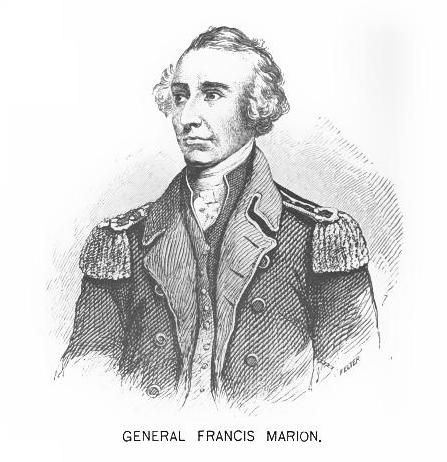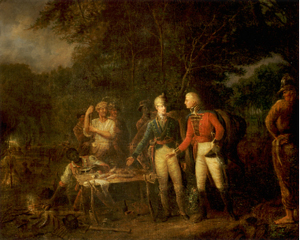Francis Marion was a soldier in the French and Indian War who built up a militia whose undercover tactics and sneaky guerrilla warfare were so effective, he became known as “the swamp fox.”
Early Life
Francis Marion was born on February 26, 1732. He was one of six children born to Gabriel and Charlotte Marion. He was born on his parents’ plantation in Berkley, South Carolina and lived there until he was five or six. Then his family settled on a plantation near Georgetown, South Carolina.
Young Francis received his first thrill of adventure at the age of 15, when he set out as a crewman aboard a schooner headed for the West Indies. On the return voyage, a whale struck the schooner, and sank it. It took seven days for the crew to reach shore on the life boat, but two of the men died from the lack of food and water on the way. After that experience, he elected to stay on land.
The French and Indian War
Shortly before his 25th birthday, he was recruited to the military to fight in the French and Indian War. He worked hard in the military and rose through the ranks.
His time in service during The French and Indian War gave Marion a lot of battle experience and also inspired his later actions. Fighting the Cherokee Indians, he couldn’t help but notice the way they hid themselves in battle and gave themselves the advantage of cover rather than lining up conveniently in bright red coats that couldn’t be missed.
About 20 years later, he would remember these ambushes and use them to his own advantage against the British.
The Revolutionary War

Francis Marion, “the Swamp Fox” | public domain image
After the French and Indian War, Francis Marion went back to farming and bought his own plantation. He was elected to the South Carolina Provincial Congress which commissioned Marion as captain of his own regiment after battles of Lexington and Concord. His first assignment was building Fort Sullivan in Charleston, SC where he and his regiment were posted.
It was customary to lock the doors when toasting to American victory in order to avoid being seen during “treasonous” acts. During a dinner party, Marion, who was not a heavy drinker, felt the drinking was getting out of control, and to get away, jumped out of a second story window, breaking his ankle. He had to leave town for medical attention.
In the spring of 1780 while Marion was still gone getting his ankle tended to, the British invaded and overthrew Charleston. Although his injury left him unable to even walk, Francis Marion formed a unit of 50 men who opposed the British in the city of Charlestown and attacked an encampment. They were able to free 150 Americans. Charleston was won back later in The Battle of Sullivan’s Island.
The Swamp Fox
His sneaky, guerrilla style of warfare was so effective, The Marion Militia were soon hated and feared by the British troops. Marion himself earned the nickname “Swamp Fox” due to his stealth and cunning. Finally, the British troops in the area could take no more and sent Lieutenant Colonel Banastre Tarleton to track down Francis and his men. However, he despaired after chasing the militia 26 miles through swampy paths to no avail. He exclaimed in exasperation, “As for this damned old fox, the Devil himself could not catch him.”
His chance to really prove himself came at the Battle of Camden when he set out to join Major General Horatio Gates. However, Gates had no faith in Francis, so he assigned him to take command of the Williamsburg Militia and go on scouting missions. Although he missed the battle, Marion took advantage of his opportunity and led his militia to many victories. The Marion Militia would rarely engage with enemies in head-on warfare. They were stealthy and defeated many larger enemy groups. Because of this, Marion is known as one of the fathers of modern guerrilla warfare.
After his time in the service he returned home to find his plantation had been burned down during the fighting. He was receiving a salary of $500 per year and found himself a new home. He finally married at 54 years old to his 49 year old cousin. He worked hard to protect the Tories who were being tortured and abused for their continued loyalty to the crown. Francis Marion died in his estate at the age of 63 in 1795.
Legends
Marion has become quite a legend and the details of his life have been exaggerated (i.e., The Patriot is loosely based on Marion’s life.) But there are a few surviving legends that are worth telling.

General Marion Inviting a British Officer to Share His Meal, painted by John Blake White hangs in the US Capitol. Oscar Marion, Marion’s slave, is in the background roasting the potatoes.
British Conversion
The first is that Marion’s Militia were roasting sweet potatoes in a fire for breakfast when a British officer arrived to discuss a prisoner exchange. After the negotiations, Marion invited the British to share breakfast.
According to the legend, the British officer was impressed by the Patriots’ resourcefulness (Marion’s tactics) and the Americans’ dedication to their cause in spite of the conditions the troops were forced to endure. He switched sides, inspired to support the American independence.
Oscar Marion
The second legend has been mentioned by President George Bush during a ceremony. Oscar Marion, one of over 200 slaves belonging to Francis Marion, was recognized for his “devoted and selfless consecration to the service of our country in the Armed Forces of the United States” by the United States President.
Oscar Marion is the slave in the background of the painting General Marion Inviting a British Officer to Share His Meal by John Blake White. Historians believe that Oscar was loyal to and fought with Francis. Given their location and the delicate nature of their work, Francis would have trusted Oscar with his life and relied on him. And if Oscar had wanted to run away, it would have only been too easy. Documents belonging to the General mention his faithfulness and loyalty. It is safe to assume that Francis Marion would not have been able to do his work without Oscar.


